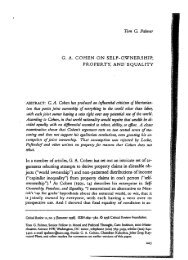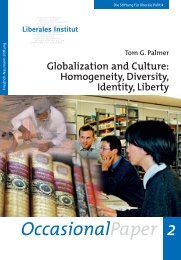Are Patents and Copyrights Morally Justified? - Tom G. Palmer
Are Patents and Copyrights Morally Justified? - Tom G. Palmer
Are Patents and Copyrights Morally Justified? - Tom G. Palmer
Create successful ePaper yourself
Turn your PDF publications into a flip-book with our unique Google optimized e-Paper software.
No. 8} <strong>Are</strong> <strong>Patents</strong> <strong>and</strong> <strong>Copyrights</strong> <strong>Morally</strong> Jus1~fied? 851<br />
The role of scarcity within the justice-as-order approach is<br />
equally important, but leads us in an entirely different direction.<br />
Rights to property are allocated precisely because the<br />
scarcity of resources means that, without legal demarcation <strong>and</strong><br />
protection of rights, human beings would come into violent<br />
conflict over these resources.<br />
This relationship between justice-as-order <strong>and</strong> property<br />
rights is what Hume is getting at when he argues that without<br />
property there is no justice:<br />
tT]ho’ I assert, that in the state of nature, or that imaginary<br />
state, which preceded society, there be neither justice nor<br />
injustice, yet I assert not, that it was allowable, in such a<br />
state, to violate the property of others. I only maintain, that<br />
there was no such thing as property; <strong>and</strong> consequently cou’d<br />
be no such thing as justice or injustice.’ 5 ’<br />
Scarcity in X-maximization arguments is the relevant factor<br />
in deciding whether intellectual property rights should be recognized,<br />
<strong>and</strong> if so, what form they should take. Scarcity in justice-as-order<br />
arguments is the relevant factor in determining<br />
when rights can or should be granted to resources over which<br />
humans may come into violent conflict. Intellectual property,<br />
however, does not have the “static” scarcity that tangible property<br />
has, <strong>and</strong> therefore does not qualify as a locus of property<br />
rights within justice-as-order arguments.’ 32 Two of us can think<br />
the same thought, sing the same song, or use the same method<br />
of making fishhooks without coming into violent conflict over<br />
the thought, song, or method.Justice-as-order, then, is incompatible<br />
with intellectual property rights.’ 33<br />
V. PIGGY-BACKING ON THE RIGHTS TO TANGIBLE PROPERTY<br />
One final argument for intellectual property rights, or at<br />
least for copyright, deserves consideration before turning to<br />
the foundation of a property-rights system consistent with liberty.<br />
That is the argument that intellectual property rights can<br />
be justified as “piggy-back” rights, logical extensions of the<br />
131. D. HUME, A TREATISE OF HUMAN NATURE 501 (P. Nidditch rev. ed. 1978) (emphasis<br />
in original).<br />
132. Such objects, however, must be produced. In this sense they do share the kind<br />
of scarcity relevant to the X-maximization arguments.<br />
133. As I shall argue at the conclusion of this Article, justice-as-order is consistent<br />
with—indeed it is the genus for—the self-ownership, liberty-based argumentfor property<br />
that, as I have argued above, is incansutent with patent<strong>and</strong> copyright.











